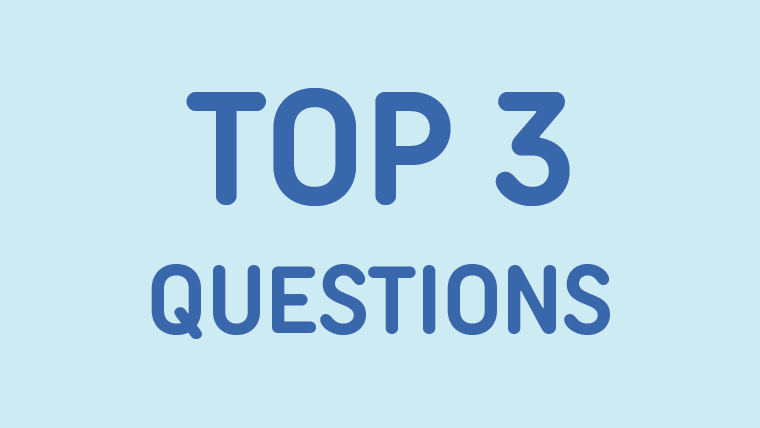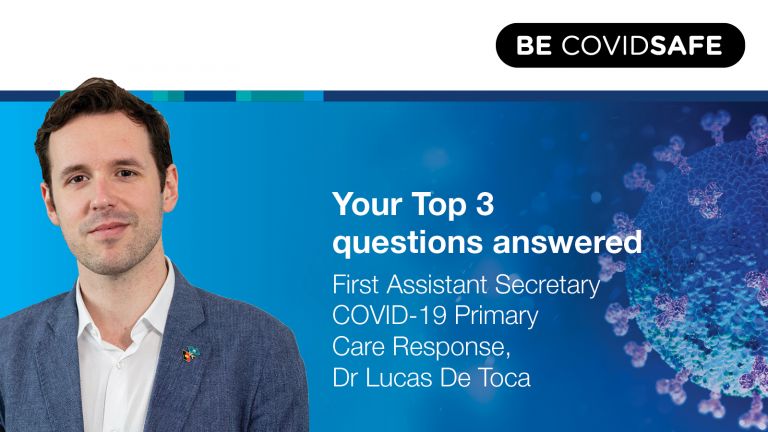
Good morning. My name is Doctor Lucas de Toca and I'm very pleased to have a bit of a different format today when we are going to be answering some of the top questions that you have asked through our social media channels. Today I'm joined by Doctor Steph Davis. Welcome Steph. Steph is a general practitioner, a public health physician, an epidemiologist, and one of Australia's Deputy Chief Medical Officers. You will start seeing more of Steph in the coming weeks as she takes on some of the top three segments and we are very pleased to have her join us today. We are also joined by Linda, as always, who will be doing Auslan interpreting. As usual, we're on the land of the Ngunnawal people. Dhawra nhuna, dhawra Ngunawal. Yanggu gulanyin ngalawiri, dhunayi, Ngunawal dhawra. Wanggarralijinyin mariny balan bugarabang, and I also extend that acknowledgement to the Traditional Owners of the lands where people may be watching from. As always, thank you for watching. You will have noticed that we are not particularly socially distanced, but Linda, Steph and I work together all the time and as part of that we are part of a work bubble. My shout out today is a collective shout out for everyone to go out and book vaccine appointments if they are eligible or if they want to consider AstraZeneca and they are not otherwise eligible, to have a chat with a health professional about it. More and more people are getting vaccinated, the vast majority of people 70 years and over have received their first dose, so it is really important we continue to support the vaccination effort as we go through.
Related to that, our first question today, we are seeing vaccine rates increasing and we are hopefully getting in a few months' time to a position with the majority of the Australian population is fully vaccinated. What happens then? Will we have booster doses ongoing like the annual flu shot or is this it?
That is a really excellent question and also a bit of a tricky one. The reason for that is because at the moment we just don't know. As we all know, the Covid vaccines are relatively new because of the pandemic is still relatively new. I know it feels like it has been going on forever but it is still relatively new. So, we know that we are probably likely to need booster doses at some point but we are not sure when that will be because at the moment we don't know how long immunity lasts from the vaccine and we don't know what those booster doses will look like. Now, what I mean by that is that we know the vaccine, sorry, the virus has changed a bit over time, we've all heard about the new Delta variant, and there will probably likely to be other variants emerging over time as well. So we may end up in a situation where we will need boosters either because our immunity wanes over time and/or because there are new variants around and we need to tweak the vaccine a little bit to stave off those variants as well. And that is really similar to what we do with the flu at the moment.
Thanks, Steph. So as we continue with the vaccination program, we've been talking about the four phases that will take us out of the Covid pandemic. Can you tell us about the plan and what it means?
So, the national plan to transition out of the pandemic, as you say, has four phases. It is moving from now, prevaccination settings, to down the track where hopefully we will be postvaccination or at least in an ongoing booster vaccination phase as we're talking about. Now, what we hope will happen during that time is it will have less need for lockdown. That is the first thing we are really aiming for, is so that we can all have some surety in our lives around planning, so less need for lockdowns. Moving on from that, they may be looking at borders reopening and moving on from that, moving back towards life as we knew it before the pandemic, noting this is all really uncertain so planning a long way ahead. The important thing we need to remember within all of this is that vaccination is not a magic bullet. The vaccines are excellent, they provide really good coverage, they are really good against protecting from severe disease and death, but they are not a magic bullet that is going to make Covid go away on their own. Even at relatively high vaccination rates, it looks unlikely that we are going to reach a stage where they will control the virus on their own. What that means is we are all going to need to continue practising COVIDSafe behaviours for a while to come. All those things that we have gotten used to doing in the past 18 months, washing our hands, trying not to get too close to people, current situation notwithstanding, covering our coughs, making sure we get tested and stay away from others when we are sick, wearing a mask sometimes if we can't physically distance from others and we are on the bus or a movie theatre or something, all of those things are going to be with us for a while to come. And that is not a bad thing because they also protect us from other respiratory viruses like the flu and like the common cold.
Thank Steph. The plan that we have been talking about is supported by some sophisticated modelling from the Doherty Institute in Melbourne and others. There has been a lot of questions from that modelling, as well as concerns from people around the Delta variant on whether that data supports going in and vaccinating kids. Is that the case? What is the evidence around that?
Yeah, so the modelling doesn't support vaccinating children, I'm just going to try to explain a little bit around why that is. Vaccination provides both direct effects to the individual, so it protects us from disease and death and, you know, hospitalisation. It also provides indirect effects, that means at a population level, it prevents us from spreading the disease to others. Now what the Doherty modelling looked at was is there a benefit in vaccinating children both to prevent them from getting sick and to prevent spread of disease more generally and preventing others getting sick. What it found was, we know that kids don't tend to get sick that often, so I know there are some concerns around the severity of the new Delta variant but at the moment the evidence is not suggesting it is any more severe than previous variants but we are watching that space closely. What that means is there is not a benefit for kids at this stage getting vaccinated to protect them from severe disease. The next question is, is there benefit in vaccinating kids to provide indirect protection to the population? Now, as anyone who has ever had a child will know, they are little snot machines, to be honest, they bring home viruses all the time and they are fantastic at spreading them. Interestingly for Covid, they are not. They are really not that important in terms of transmission. Even vaccinating them to protect the rest of the population actually isn't that useful. Just to add to that, though, probably a lot of people have heard that the TGA recently approved the Pfizer vaccine down for 12 to 15 year olds, that is a lowering of the age group, and ATAGI then recommended, that is the Australian Technical Advisory Group on Immunisation, recommended this vaccine be available to certain population groups and these include children within the 12 to 15 year old age groups who have severe disability or other severe conditions which put them at risk of severe disease, and again, this is coming back to the direct protection. That is the one exception to this general question around the benefits of vaccination for children.
Thanks Steph, and Steph highlighted from yesterday, children 12 to 15 years of age, who have underlying medical conditions or severe disability, who are Aboriginal or Torres Straight Islander, or who are in remote communities for which a whole of community approach is underway, are eligible to receive the vaccination, and we will keep reviewing the evidence and see what ATAGI and the TGA recommend for the rest of the 12 to 15 year old population and noting what Steph just walked us through.
Thank you, Steph. That was a great segment with lots of useful information. Hopefully people found it as useful as I did. We look forward to seeing more segments with you leading on the questions from the people who are watching. Thank you, Linda, for your interpreting, and that is all we have for today. Thank you so much for continuing to engage, submitting your questions, and practising COVIDSafe behaviours, and thank you for going out and getting vaccinated. We will see you next time. Thanks.
Top 3 questions
- Once the vast majority of Australians are vaccinated with COVID-19 vaccines, will we need booster shots like the annual flu vaccine?
- As more Australians are vaccinated, what will the phased approach to the pathway out of lockdowns and restrictions mean for COVID Safe behaviours?
- Does the Doherty Institute modelling report suggest there are benefits to vaccinating children?







